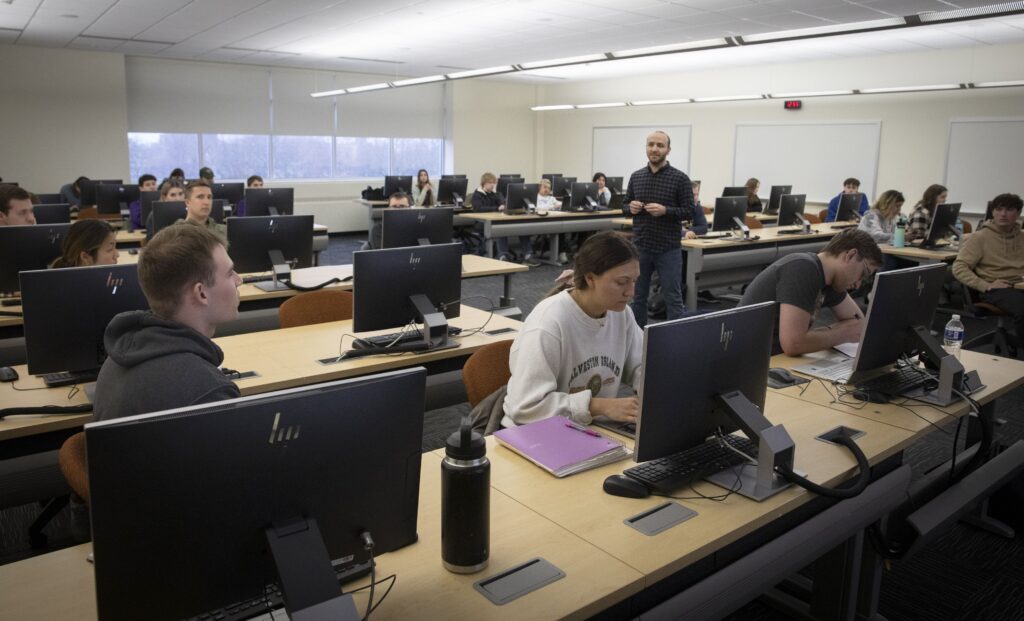This post is part of the 2024-25 UWW Teaching and Learning grants program. The program awards $1,000 grants to faculty and instructional academic staff looking to integrate new educational methods into their classrooms and learning environments. The grant program underscores UWW’s commitment to embracing inclusive pedagogy and to exploring and evaluating emerging technologies that foster creative approaches to teaching and learning.
Turning AI into a Teaching Ally: Rethinking the Policy Brief in Gender & Violence
Krista McQueeney, Department of Sociology, Criminology & Anthropology
When ChatGPT burst onto the academic scene, many of us in higher education were understandably concerned. Would students use it to bypass critical thinking? Could it undermine the integrity of assignments like the policy brief I traditionally assigned in my Gender & Violence course (WMST 351)?
Initially, I considered ways to “AI-proof” my assignments. But I soon realized that banning AI tools wasn’t a sustainable or educationally sound approach. Instead, I decided to integrate AI into the learning process, transforming it from a potential threat into a powerful teaching tool.
The Assignment: Critically Engaging with AI
With support from the LEARN Center, I redesigned the final project into a three-part assignment that encouraged students to interact with AI thoughtfully:
- AI-Generated Draft: Students prompted ChatGPT to generate a policy brief on a gender violence-related issue of their choice.
- Critical Reflection: They then wrote a reflection analyzing the AI-generated brief, addressing questions such as:
- Was the information factually accurate? How could they verify it?
- Did the brief incorporate an intersectional analysis considering race, class, gender identity, sexuality, ability, etc.?
- How would they revise and expand upon the AI’s work?
- What are the broader social implications of AI for their generation and society?
- Visual Policy Brief: Finally, students used Canva to create a visually compelling policy brief that highlighted key statistics, policies, intersectional dimensions, and actionable recommendations for social change.
Outcomes: Deepening Critical Engagement
The results were impressive. Students didn’t just critique the AI-generated content; they engaged deeply with the material, identifying inaccuracies, biases, and omissions. They demonstrated an understanding of the importance of intersectionality in policy analysis and recognized the limitations of AI in capturing these complexities.
Moreover, the assignment sparked thoughtful discussions about the role of AI in society. Students expressed concerns about over-reliance on AI, potential biases in AI outputs, and the ethical implications of AI in policymaking and advocacy. They also appreciated the opportunity to develop digital literacy skills by using tools like Canva to communicate their ideas effectively.
Reflections: Embracing AI as a Pedagogical Tool
This assignment reaffirmed that educators and AI don’t have to be adversaries. When integrated thoughtfully, AI can enhance learning by prompting students to think critically, question sources, and engage more deeply with content. It prepares them for a world where AI is increasingly prevalent, equipping them with the skills to navigate and critique AI-generated information responsibly.
For educators considering how to respond to the rise of AI, I encourage you to explore ways to incorporate AI into your teaching. By doing so, we can foster critical thinking, promote digital literacy, and prepare our students to be thoughtful, informed participants in an AI-infused world.
Note: For educators interested in integrating AI tools into their teaching, resources such as Stanford’s Teaching Commons offer strategies for incorporating AI into assignments to enhance student learning.







